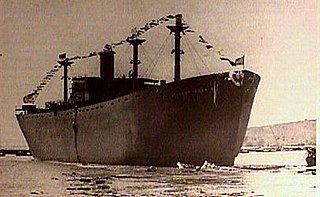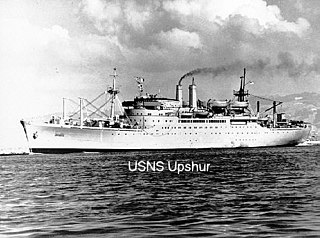The United States Armed Forces are the military forces of the United States. The armed forces consists of six service branches: the Army, Marine Corps, Navy, Air Force, Space Force, and Coast Guard. All six armed services are among the eight uniformed services of the United States.

The United States Coast Guard (USCG) is the maritime security, search and rescue, and law enforcement service branch of the United States Armed Forces and one of the country's eight uniformed services. The service is a maritime, military, multi-mission service unique among the United States military branches for having a maritime law enforcement mission with jurisdiction in both domestic and international waters and a federal regulatory agency mission as part of its duties. It is the largest coast guard in the world, rivaling the capabilities and size of most navies.

The United States Secretary of Homeland Security is the head of the United States Department of Homeland Security, the federal department tasked with ensuring public safety in the United States. The secretary is a member of the Cabinet of the United States. The position was created by the Homeland Security Act following the attacks of September 11, 2001.

The United States Merchant Marine is an organization composed of United States civilian mariners and U.S. civilian and federally owned merchant vessels. Both the civilian mariners and the merchant vessels are managed by a combination of the government and private sectors, and engage in commerce or transportation of goods and services in and out of the navigable waters of the United States. The Merchant Marine primarily transports domestic and international cargo and passengers during peacetime, and operate and maintain deep-sea merchant ships, tugboats, towboats, ferries, dredges, excursion vessels, charter boats and other waterborne craft on the oceans, the Great Lakes, rivers, canals, harbors, and other waterways. In times of war, the Merchant Marine can be an auxiliary to the United States Navy, and can be called upon to deliver military personnel and materiel for the military.

The United States Merchant Marine Academy is a United States service academy in Kings Point, New York. It trains its midshipmen to serve as officers in the United States Merchant Marine, branches of the United States Armed Forces and the transportation industry. Midshipmen are trained in different fields such as marine engineering, navigation, ship's administration, maritime law, personnel management, international law, customs, and many other subjects important to the task of running a large ship.

SS Stephen Hopkins was a United States Merchant Marine Liberty ship that served in World War II. She was the only US merchant vessel to sink a German surface combatant during the war.

The United States Maritime Administration (MARAD) is an agency of the United States Department of Transportation. MARAD administers financial programs to develop, promote, and operate the U.S. Maritime Service and the U.S. Merchant Marine. In addition, it conducts research and development activities in the maritime field; regulates the transfer of U.S. documented vessels to foreign registries; maintains equipment, shipyard facilities, and reserve fleets of Government-owned ships essential for national defense.
Its programs promote the use of waterborne transportation and its seamless integration with other segments of the transportation system, and the viability of the U.S. merchant marine. The Maritime Administration works in many areas involving ships and shipping, shipbuilding, port operations, vessel operations, national security, environment, and safety. The Maritime Administration is also charged with maintaining the health of the merchant marine, since commercial mariners, vessels, and intermodal facilities are vital for supporting national security, and so the agency provides support and information for current mariners, extensive support for educating future mariners, and programs to educate America's young people about the vital role the maritime industry plays in the lives of all Americans.

The Merchant Marine Act of 1920 is a United States federal statute that provides for the promotion and maintenance of the American merchant marine. Among other purposes, the law regulates maritime commerce in U.S. waters and between U.S. ports. Section 27 of the Merchant Marine Act is known as the Jones Act and deals with cabotage. It requires that all goods transported by water between U.S. ports be carried on ships that have been constructed in the United States and that fly the U.S. flag, are owned by U.S. citizens, and are crewed by U.S. citizens and U.S. permanent residents. The act was introduced by Senator Wesley Jones. The law also defines certain seaman's rights.

The Coast Guard Judge Advocate General oversees the delivery of legal services to the United States Coast Guard, through the Office of the Judge Advocate General in Washington, the Legal Service Command, offices in the Atlantic and Pacific Areas, nine Coast Guard Districts, the Coast Guard Academy, three training centers, and a number of other activities and commands. Legal services are delivered by Coast Guard judge advocates and civilian counsel in ten legal practice areas: criminal law/military justice, operations, international activities, civil advocacy, environmental law, procurement law, internal organizational law, regulations and administrative law, legislative support and legal assistance.
Executive Schedule is the system of salaries given to the highest-ranked appointed officials in the executive branch of the U.S. government. The president of the United States appoints individuals to these positions, most with the advice and consent of the United States Senate. They include members of the president's Cabinet, several top-ranking officials of each executive department, the directors of some of the more prominent departmental and independent agencies, and several members of the Executive Office of the President.
The Merchant Marine Gallant Ship Citation is an award of the United States Merchant Marine. The award is presented as a bronze plaque to vessels, with officers and crew being awarded a ribbon bar to denote the award. Both United States flagged vessels and foreign flagged vessels are eligible for the award.
The Cargo Preference Act or Cargo Preference refers generally to legal requirements for the carriage of government-impelled cargoes on the vessels flagged within the registry of that government for the purpose of promoting a national merchant marine. Cargo Preference is commonplace among the world's seafaring nations, including Australia, Brazil, France, Japan, Taiwan.
John E. Jamian is an American businessman, former U.S. government official, and Michigan State Legislator. He served as deputy and later acting maritime administrator, the head of the U.S. Maritime Administration, an agency of the United States Department of Transportation, from 2003 until 2006. He was confirmed as deputy maritime administrator by the Senate on May 7, 2003 and became acting maritime administrator February 12, 2005. Prior to his service at the Maritime Administration, Jamian was elected to three terms in the Michigan House of Representatives from 1991 to 1996. From 1997 to 2001 he served as executive director of the Detroit/Wayne County Port Authority and from 2001 until his appointment as deputy director in 2003 as the executive director the Armenian Assembly of America. Between 2011 and 2015, Jamian resumed his role as executive director at the Port of Detroit. Since returning to private life in 2015, he has held the position of Chief Operations Officer for Troy, Michigan based AmeriCare Medical Inc. and continues to serve as the Armenian Assembly of America's State of Michigan Director.
USA Maritime is a coalition of American ship operators, maritime labor organizations and related maritime associations. The purpose of the coalition is to educate policy makers, the media, and the public about the U.S. merchant marine and the importance of the U.S. maritime industry to the military, economy, and homeland security of the United States.

USNS Upshur (T-AP-198), was a Barrett Class transport named in honor of Major General William P. Upshur, USMC.

The Howard Coble Coast Guard and Maritime Transportation Act of 2014 is a statute of the United States that governs the activities of the United States Coast Guard (USCG), the Maritime Administration (MARAD) within the Department of Transportation, and the Federal Maritime Commission (FMC). The bill also would authorize appropriations totaling about $17.5 billion, primarily for ongoing USCG operations over the 2015-2016 period.

The United States Committee on the Marine Transportation System (CMTS) is an inter-agency committee authorized by the United States Coast Guard and the Maritime Transportation Act of 2012 to coordinate policies affecting the U.S. Marine Transportation System (MTS).
Paul N. "Chip" Jaenichen is an American retired United States Navy officer who served as the Administrator of the United States Maritime Administration from July 25, 2014, to January 13, 2017.

Linda Lee Fagan is a United States Coast Guard admiral who serves as the 27th Commandant of the Coast Guard. Previously, in 2021 she became the 32nd Vice Commandant of the Coast Guard and the Coast Guard’s first female four-star admiral. Before that, she was the commander of the Coast Guard Pacific Area with prior terms as Coast Guard Deputy for Operations, Policy, and Capabilities, commander, First Coast Guard District, and commander, Coast Guard Sector New York. Fagan is also the Coast Guard's first Gold Ancient Trident, the officer with the longest service record in the Marine Safety Field. In April 2021, Secretary of Homeland Security Alejandro Mayorkas announced her nomination as the next Vice Commandant of the Coast Guard, succeeding Charles W. Ray. She was confirmed on June 17, 2021, and assumed office on June 18.











